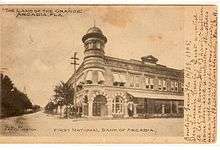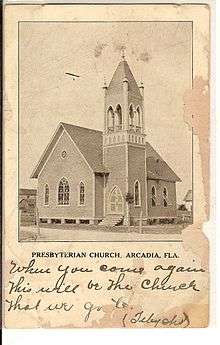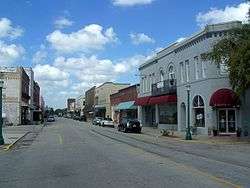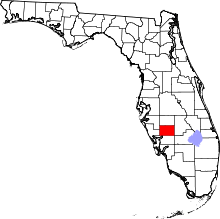Arcadia, Florida
| Arcadia, Florida | |
|---|---|
| City | |
|
Arcadia Historic District | |
 Location in DeSoto County and the state of Florida | |
| Country | United States |
| State | Florida |
| County | DeSoto |
| The City of Arcadia | 1886 |
| Named for | Arcadia Albritton |
| Government | |
| • Type | Council-Manager |
| • Mayor | Susan Coker |
| • Deputy Mayor | Alice Frierson |
| • Councilman | Joseph Fink |
| • Councilwoman | Judy Hinson Wertz Strickland |
| • Councilman | Delshay Turner |
| Area | |
| • Total | 4.09 sq mi (10.59 km2) |
| • Land | 4.08 sq mi (10.57 km2) |
| • Water | 0.008 sq mi (0.02 km2) |
| Elevation | 60 ft (20 m) |
| Population (2010) | |
| • Total | 7,637 |
| • Estimate (2014) | 7,722 |
| • Density | 1,892/sq mi (730.6/km2) |
| Time zone | EST (UTC-5) |
| • Summer (DST) | EDT (UTC-4) |
| ZIP codes | 34265, 34266 & 34269 |
| Area code(s) | 863 |
| FIPS code | 12-01750 |
| Website |
www |
Arcadia is a city and county seat of DeSoto County, Florida, United States.[1] The population was 7,637 as of the 2010 census,[2] with an estimated population of 7,722 in 2014.[3] Arcadia's Historic District is listed on the National Register of Historic Places.
History


According to The Atlas of Florida, "The Rev. James Madison ("Boss") Hendry (1839–1922) named the town in honor of Arcadia Albritton (1861–1932), a daughter of Thomas H. and Fannie (Waldron) Albritton, pioneer settlers. Arcadia had baked him a cake for his birthday and he appreciated it so much that he named the city after her."[4]
During the late 19th century Arcadia was the county seat of what would become many counties. In 1921 legislation enacted called for Arcadia to remain the county seat of DeSoto County and resulted in the creation of the present-day counties of Charlotte, Hardee, Glades and Highlands. Prior to this breakup Arcadia's population had grown considerably, with over 1,000 permanent residents and 3,000 square miles (7,800 km2) for ranching.
On Thanksgiving Day in 1905 the town was destroyed by a large-scale fire that originated from a mid-town livery stable. The fire was exacerbated because the town did not have a working water system or fire department. The estimated monetary damage was $250,000, but there was no loss of life. Much of the business district was not spared. It would be years before the town recovered.
Oak Street is the "main street" in Arcadia. The downtown is far more elaborate than neighboring counties' downtown areas, as Arcadia is older and was their county seat prior to the formation of their present counties. Arcadia is also home to many early 20th century homes, houses of worship and several historic public buildings.
From 1917 to 1922, Arcadia was the home of Carlstrom Field, a grass airfield of the U.S. Army Air Service named for deceased aviation pioneer Victor Carlstrom. Carlstrom Field was used for pilot training both during and after World War I. In May 1941 the site again became an airfield for military primary flight training, operated by the Embry–Riddle Aeronautical Institute (now Embry–Riddle Aeronautical University). Carlstrom Field, one of several satellite fields in the Fort Myers area, also trained pilots for the Royal Air Force until its closing in 1945.
Arcadia's historic buildings include the Johnson-Smith House, William Oswell Ralls House and Micajah T. Singleton House. Also, approximately 3,400 acres which includes the downtown area are part of the Arcadia Historic District.
Historical notes
The city was devastated by Hurricane Charley on August 13, 2004. Arcadia was featured in an episode of the Travel Channel show Cash & Treasures Treasure Hunter: Kirsten Gum which aired in 2006. The episode included locals helping Kirsten dig for fossil shark teeth in the Peace River. On October 27, 2009, President Barack Obama visited Arcadia, becoming the first sitting president to do so.
Geography
Arcadia is located slightly northwest of the center of DeSoto County at 27°13'N 81°52'W (27.2176, -81.8599). The Peace River flows past the west side of the city on its way southwest to tidewater at Punta Gorda.
U.S. Route 17 passes through the center of Arcadia, leading north 50 miles (80 km) to Bartow and southwest 26 miles (42 km) to its terminus at Punta Gorda. Florida State Road 70 crosses US 17 in the center of Arcadia and leads east 64 miles (103 km) to Okeechobee and west-northwest 48 miles (77 km) to South Bradenton. Via SR 72, which splits from SR 70 just west of Arcadia, it is 44 miles (71 km) west to South Sarasota.
According to the United States Census Bureau, Arcadia has a total area of 4.1 square miles (10.6 km2), of which 0.01 square miles (0.02 km2), or 0.15%, is water.[2]
Demographics
| Historical population | |||
|---|---|---|---|
| Census | Pop. | %± | |
| 1900 | 799 | — | |
| 1910 | 1,736 | 117.3% | |
| 1920 | 3,479 | 100.4% | |
| 1930 | 4,082 | 17.3% | |
| 1940 | 4,055 | −0.7% | |
| 1950 | 4,764 | 17.5% | |
| 1960 | 5,889 | 23.6% | |
| 1970 | 5,658 | −3.9% | |
| 1980 | 6,002 | 6.1% | |
| 1990 | 6,488 | 8.1% | |
| 2000 | 6,604 | 1.8% | |
| 2010 | 7,637 | 15.6% | |
| Est. 2015 | 7,851 | [5] | 2.8% |
As of the census[7] of 2010, there were 7,637 people, 2,955 households, and 1,659 families residing in the city. The population density was 1,635.6 people per square mile (631.1/km²). There were 2,604 housing units at an average density of 644.9 per square mile (248.9/km²). The racial makeup of the city was 42.11% White, 20.05% Hispanic, 28.09% African American, 0.38% Native American, 0.82% Asian, 0.02% Pacific Islander, 7.18% from other races, and 1.41% from two or more races.
There were 2,289 households out of which 34.3% had children under the age of 18 living with them, 40.9% were married couples living together, 20.1% had a female householder with no husband present, and 33.0% were non-families. 25.7% of all households were made up of individuals and 12.5% had someone living alone who was 65 years of age or older. The average household size was 2.75 and the average family size was 3.22.
In the city the population was spread out with 29.2% under the age of 18, 10.3% from 18 to 24, 27.2% from 25 to 44, 19.0% from 45 to 64, and 14.3% who were 65 years of age or older. The median age was 32 years. For every 100 females there were 102.0 males. For every 100 females age 18 and over, there were 100.5 males.
The median income for a household in the city was $25,025, and the median income for a family was $29,593. Males had a median income of $22,518 versus $18,666 for females. The per capita income for the city was $11,893. About 20.2% of families and 25.9% of the population were below the poverty line, including 34.1% of those under age 18 and 8.2% of those age 65 or over.
Government
The City of Arcadia was created by an act of the Florida Legislature in 1886. Currently the city is governed by a council/manager form of government, with five council members elected at large to four-year terms of office who in turn appoint a city manager to run the daily operation of the city. The council annually chooses a mayor and deputy mayor who serve in the capacity of chairman of meetings and at ceremonial functions. Also elected by the residents is a City Marshal who acts as Chief of Police. In addition to police service, the city provides residents with a water/sewer system, trash pickup, planning and zoning services, and public works.
Transportation
Arcadia Municipal Airport is a public-use airport located 1 mile (1.6 km) southeast of the central business district. A new fixed-base operator has been contracted for the day-to-day operations of the airport. The airport has a deep history of aviation, with the old Carlstrom & Dorr training fields in DeSoto County.
Annual events
Arcadia Municipal Airport hosts an annual Aviation Day event in the month of March. Currently the event consists of a static display of aircraft, biplane rides, helicopter rides, and a skydiving demonstration, but bigger plans are in the works.
Arcadia is located on the Peace River, the major tributary of the Charlotte Harbor estuary. The river offers fine canoeing, shark tooth hunting and natural habitats. Tours, recreational accessories and accommodations are readily available.
Arcadia hosts DeSoto County's annual fair usually in the month of January. While traditional aspects of a fair or carnival are provided, the event also presents livestock shows consisting of swine and cattle, which are presented by the local FFA and 4-H.
Arcadia is also the home of three rodeos. These events, which are managed by the local rodeo association, occur during the month of March, the Fourth of July holiday, and in the fall. From the profits of these events many local charities, college scholarships and causes receive funding.
Arcadia is one of the largest groupings of antique dealers in the state, all located conveniently in the downtown area. The local dealers' association sponsors a "4th Saturday Antique Fair" each month from 8 am to 3 pm, bringing an additional 60 to 120 independent dealers in for the event.
Arcadia has numerous parades throughout the year—a Martin Luther King Jr. Day Parade, a March Rodeo Parade, a Cinco de Mayo Parade, an Independence Day Parade, an October Homecoming Parade, a Veterans Day Parade and a Christmas Parade.
Media
- WFLN-AM (1480 WFLN Newsradio)
- WZZS-FM (106.9 The Bull)
- WZSP-FM (105.3 La Zeta)
- The Arcadian, local print newspaper
Notable people
- Chris Clemons, professional football player for the NFL Miami Dolphins and the Arizona Cardinals
- James L. Dozier, retired US Army general
- Bitsy Mott, born in Arcadia, Major League Baseball player
- Ray brothers, HIV activists
- John Paul Riddle, co-founder of Embry-Riddle Aeronautical University
Climate
The climate in this area is characterized by hot, humid summers and generally mild to cool winters. According to the Köppen Climate Classification system, Arcadia has a humid subtropical climate, abbreviated "Cfa" on climate maps. [8]
References
- ↑ "Find a County". National Association of Counties. Archived from the original on 2011-05-31. Retrieved 2011-06-07.
- 1 2 "Geographic Identifiers: 2010 Demographic Profile Data (G001): Arcadia city, Florida". U.S. Census Bureau, American Factfinder. Retrieved October 19, 2015.
- ↑ "Annual Estimates of the Resident Population for Incorporated Places: April 1, 2010 to July 1, 2014". Retrieved June 4, 2015.
- ↑ "City Name Origins". Florida Department of State, Division of Historical Resources. Retrieved October 19, 2015.
- ↑ "Annual Estimates of the Resident Population for Incorporated Places: April 1, 2010 to July 1, 2015". Retrieved July 2, 2016.
- ↑ "Census of Population and Housing". Census.gov. Archived from the original on May 11, 2015. Retrieved June 4, 2015.
- ↑ "American FactFinder". United States Census Bureau. Archived from the original on 2013-09-11. Retrieved 2008-01-31.
- ↑ Climate Summary for Arcadia, Florida
External links
| Wikimedia Commons has media related to Arcadia, Florida. |
- City of Arcadia official website
- DeSoto Arts and Humanities Council
- DeSoto County Historical Society
- Desoto County Tourism Development Council
- Directory of the Peace River Valley


